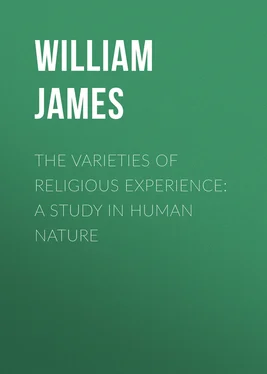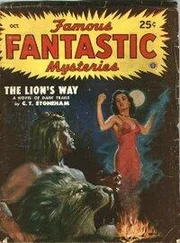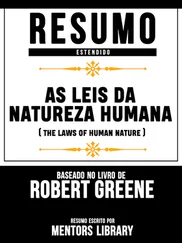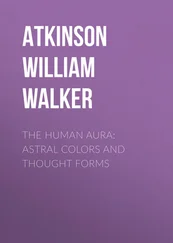William James - The Varieties of Religious Experience - A Study in Human Nature
Здесь есть возможность читать онлайн «William James - The Varieties of Religious Experience - A Study in Human Nature» — ознакомительный отрывок электронной книги совершенно бесплатно, а после прочтения отрывка купить полную версию. В некоторых случаях можно слушать аудио, скачать через торрент в формате fb2 и присутствует краткое содержание. Жанр: foreign_prose, foreign_religion, Философия, foreign_psychology, foreign_antique, на английском языке. Описание произведения, (предисловие) а так же отзывы посетителей доступны на портале библиотеки ЛибКат.
- Название:The Varieties of Religious Experience: A Study in Human Nature
- Автор:
- Жанр:
- Год:неизвестен
- ISBN:нет данных
- Рейтинг книги:4 / 5. Голосов: 1
-
Избранное:Добавить в избранное
- Отзывы:
-
Ваша оценка:
- 80
- 1
- 2
- 3
- 4
- 5
The Varieties of Religious Experience: A Study in Human Nature: краткое содержание, описание и аннотация
Предлагаем к чтению аннотацию, описание, краткое содержание или предисловие (зависит от того, что написал сам автор книги «The Varieties of Religious Experience: A Study in Human Nature»). Если вы не нашли необходимую информацию о книге — напишите в комментариях, мы постараемся отыскать её.
The Varieties of Religious Experience: A Study in Human Nature — читать онлайн ознакомительный отрывок
Ниже представлен текст книги, разбитый по страницам. Система сохранения места последней прочитанной страницы, позволяет с удобством читать онлайн бесплатно книгу «The Varieties of Religious Experience: A Study in Human Nature», без необходимости каждый раз заново искать на чём Вы остановились. Поставьте закладку, и сможете в любой момент перейти на страницу, на которой закончили чтение.
Интервал:
Закладка:
In fact, one might almost as well interpret religion as a perversion of the respiratory function. The Bible is full of the language of respiratory oppression: “Hide not thine ear at my breathing; my groaning is not hid from thee; my heart panteth, my strength faileth me; my bones are hot with my roaring all the night long; as the hart panteth after the water-brooks, so my soul panteth after thee, O my God.” God's Breath in Man is the title of the chief work of our best known American mystic (Thomas Lake Harris); and in certain non-Christian countries the foundation of all religious discipline consists in regulation of the inspiration and expiration.
These arguments are as good as much of the reasoning one hears in favor of the sexual theory. But the champions of the latter will then say that their chief argument has no analogue elsewhere. The two main phenomena of religion, namely, melancholy and conversion, they will say, are essentially phenomena of adolescence, and therefore synchronous with the development of sexual life. To which the retort again is easy. Even were the asserted synchrony unrestrictedly true as a fact (which it is not), it is not only the sexual life, but the entire higher mental life which awakens during adolescence. One might then as well set up the thesis that the interest in mechanics, physics, chemistry, logic, philosophy, and sociology, which springs up during adolescent years along with that in poetry and religion, is also a perversion of the sexual instinct:—but that would be too absurd. Moreover, if the argument from synchrony is to decide, what is to be done with the fact that the religious age par excellence would seem to be old age, when the uproar of the sexual life is past?
The plain truth is that to interpret religion one must in the end look at the immediate content of the religious consciousness. The moment one does this, one sees how wholly disconnected it is in the main from the content of the sexual consciousness. Everything about the two things differs, objects, moods, faculties concerned, and acts impelled to. Any general assimilation is simply impossible: what we find most often is complete hostility and contrast. If now the defenders of the sex-theory say that this makes no difference to their thesis; that without the chemical contributions which the sex-organs make to the blood, the brain would not be nourished so as to carry on religious activities, this final proposition may be true or not true; but at any rate it has become profoundly uninstructive: we can deduce no consequences from it which help us to interpret religion's meaning or value. In this sense the religious life depends just as much upon the spleen, the pancreas, and the kidneys as on the sexual apparatus, and the whole theory has lost its point in evaporating into a vague general assertion of the dependence, somehow , of the mind upon the body.
2
For a first-rate example of medical-materialist reasoning, see an article on “les Variétés du Type dévot,” by Dr. Binet-Sanglé, in the Revue de l'Hypnotisme, xiv. 161.
3
J. F. Nisbet: The Insanity of Genius, 3d ed., London, 1893, pp. xvi, xxiv.
4
Max Nordau, in his bulky book entitled Degeneration .
5
H. Maudsley: Natural Causes and Supernatural Seemings, 1886, pp. 257, 256.
6
Autobiography, ch. xxviii.
7
Superior intellect, as Professor Bain has admirably shown, seems to consist in nothing so much as in a large development of the faculty of association by similarity.
8
I may refer to a criticism of the insanity theory of genius in the Psychological Review, ii. 287 (1895).
9
I can do no better here than refer my readers to the extended and admirable remarks on the futility of all these definitions of religion, in an article by Professor Leuba, published in the Monist for January, 1901, after my own text was written.
10
Miscellanies, 1868, p. 120 (abridged).
11
Lectures and Biographical Sketches, 1868, p. 186.
12
Feuilles détachées, pp. 394-398 (abridged).
13
Op. cit., pp. 314, 313.
14
Book V., ch. x. (abridged).
15
Book V., ch. ix. (abridged).
16
Chaps. x., xi. (abridged): Winkworth's translation.
17
Book IV., § 23.
18
Benham's translation: Book III., chaps. xv., lix. Compare Mary Moody Emerson: “Let me be a blot on this fair world, the obscurest, the loneliest sufferer, with one proviso,—that I know it is His agency. I will love Him though He shed frost and darkness on every way of mine.” R. W. Emerson: Lectures and Biographical Sketches, p. 188.
19
Once more, there are plenty of men, constitutionally sombre men, in whose religious life this rapturousness is lacking. They are religious in the wider sense; yet in this acutest of all senses they are not so, and it is religion in the acutest sense that I wish, without disputing about words, to study first, so as to get at its typical differentia .
20
The New Spirit, p. 232.
21
I owe this allegorical illustration to my lamented colleague and friend, Charles Carroll Everett.
22
Example: “I have had much comfort lately in meditating on the passages which show the personality of the Holy Ghost, and his distinctness from the Father and the Son. It is a subject that requires searching into to find out, but, when realized, gives one so much more true and lively a sense of the fullness of the Godhead, and its work in us and to us, than when only thinking of the Spirit in its effect on us.” Augustus Hare: Memorials, i. 244, Maria Hare to Lucy H. Hare.
23
Symposium, Jowett, 1871, i. 527.
24
Example: “Nature is always so interesting, under whatever aspect she shows herself, that when it rains, I seem to see a beautiful woman weeping. She appears the more beautiful, the more afflicted she is.” B. de St. Pierre.
25
Journal of the S. P. R., February, 1895, p. 26.
26
E. Gurney: Phantasms of the Living, i. 384.
27
Pensées d'un Solitaire, p. 66.
28
Letters of Lowell, i. 75.
29
I borrow it, with Professor Flournoy's permission, from his rich collection of psychological documents.
30
Mark Rutherford's Deliverance, London, 1885, pp. 196, 198.
31
In his book (too little read, I fear), Natural Religion, 3d edition, Boston, 1886, pp. 91, 122.
32
C. Hilty: Glück, dritter Theil, 1900, p. 18.
33
The Soul; its Sorrows and its Aspirations, 3d edition, 1852, pp. 89, 91.
34
I once heard a lady describe the pleasure it gave her to think that she “could always cuddle up to God.”
35
John Weiss: Life of Theodore Parker, i. 152, 32.
36
Starbuck: Psychology of Religion, pp. 305, 306.
37
“I know not to what physical laws philosophers will some day refer the feelings of melancholy. For myself, I find that they are the most voluptuous of all sensations,” writes Saint Pierre, and accordingly he devotes a series of sections of his work on Nature to the Plaisirs de la Ruine, Plaisirs des Tombeaux, Ruines de la Nature, Plaisirs de la Solitude—each of them more optimistic than the last.
Читать дальшеИнтервал:
Закладка:
Похожие книги на «The Varieties of Religious Experience: A Study in Human Nature»
Представляем Вашему вниманию похожие книги на «The Varieties of Religious Experience: A Study in Human Nature» списком для выбора. Мы отобрали схожую по названию и смыслу литературу в надежде предоставить читателям больше вариантов отыскать новые, интересные, ещё непрочитанные произведения.
Обсуждение, отзывы о книге «The Varieties of Religious Experience: A Study in Human Nature» и просто собственные мнения читателей. Оставьте ваши комментарии, напишите, что Вы думаете о произведении, его смысле или главных героях. Укажите что конкретно понравилось, а что нет, и почему Вы так считаете.












